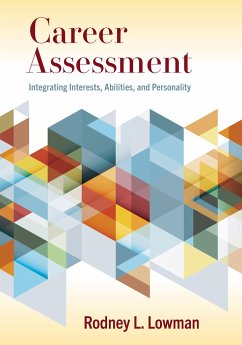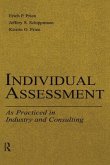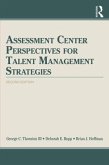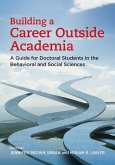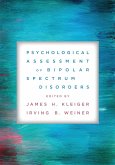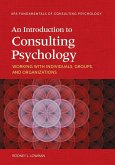- Broschiertes Buch
- Merkliste
- Auf die Merkliste
- Bewerten Bewerten
- Teilen
- Produkt teilen
- Produkterinnerung
- Produkterinnerung
This book will help career assessors offer practical guidance that can make a real difference in people's lives.
Andere Kunden interessierten sich auch für
![Career Psychology Career Psychology]() Career Psychology120,99 €
Career Psychology120,99 €![Individual Assessment Individual Assessment]() Kristin O PrienIndividual Assessment86,99 €
Kristin O PrienIndividual Assessment86,99 €![Assessment Center Perspectives for Talent Management Strategies Assessment Center Perspectives for Talent Management Strategies]() George C Thornton IIIAssessment Center Perspectives for Talent Management Strategies90,99 €
George C Thornton IIIAssessment Center Perspectives for Talent Management Strategies90,99 €![Building a Career Outside Academia Building a Career Outside Academia]() Building a Career Outside Academia42,99 €
Building a Career Outside Academia42,99 €![Psychological Assessment of Bipolar Spectrum Disorders Psychological Assessment of Bipolar Spectrum Disorders]() Psychological Assessment of Bipolar Spectrum Disorders84,99 €
Psychological Assessment of Bipolar Spectrum Disorders84,99 €![The AHA! Handbook: How to spark the insights that will transform your life and career The AHA! Handbook: How to spark the insights that will transform your life and career]() Donna R. HartneyThe AHA! Handbook: How to spark the insights that will transform your life and career17,99 €
Donna R. HartneyThe AHA! Handbook: How to spark the insights that will transform your life and career17,99 €![An Introduction to Consulting Psychology An Introduction to Consulting Psychology]() Rodney L LowmanAn Introduction to Consulting Psychology60,99 €
Rodney L LowmanAn Introduction to Consulting Psychology60,99 €-
-
-
This book will help career assessors offer practical guidance that can make a real difference in people's lives.
Hinweis: Dieser Artikel kann nur an eine deutsche Lieferadresse ausgeliefert werden.
Hinweis: Dieser Artikel kann nur an eine deutsche Lieferadresse ausgeliefert werden.
Produktdetails
- Produktdetails
- Verlag: American Psychological Association (APA)
- Seitenzahl: 582
- Erscheinungstermin: 21. September 2021
- Englisch
- Abmessung: 251mm x 178mm x 30mm
- Gewicht: 1057g
- ISBN-13: 9781433836930
- ISBN-10: 1433836939
- Artikelnr.: 61331224
- Herstellerkennzeichnung
- Libri GmbH
- Europaallee 1
- 36244 Bad Hersfeld
- gpsr@libri.de
- Verlag: American Psychological Association (APA)
- Seitenzahl: 582
- Erscheinungstermin: 21. September 2021
- Englisch
- Abmessung: 251mm x 178mm x 30mm
- Gewicht: 1057g
- ISBN-13: 9781433836930
- ISBN-10: 1433836939
- Artikelnr.: 61331224
- Herstellerkennzeichnung
- Libri GmbH
- Europaallee 1
- 36244 Bad Hersfeld
- gpsr@libri.de
Rodney L. Lowman, PhD, ABAP, is president of Lowman & Richardson/Consulting Psychologists, and a distinguished professor emeritus of CSPP, Alliant International University, San Diego. Dr. Lowman is author/editor of 13 books and monographs and over 130 peer-reviewed articles and chapters and has made presentations worldwide. His research/practice areas include assessment, career/work issues, and professional ethics. He is a fellow of several American Psychological Association divisions (1, 10, 12, 13, 14, 17, and 52). His books include Counseling and Psychotherapy of Work Dysfunctions; An Introduction to Consulting Psychology: Working With Individuals, Groups, and Organizations; and Career Assessment: Integrating Interests, Abilities, and Personality.
Preface
Introduction: The Interdomain Model of Career Assessment
Chapter 1. Scope of Career Assessment Work
I. Assessing Vocational Interests
Chapter 2. Defining and Contextualizing Vocational Interests
Chapter 3. The “Big Six” RIASEC Interest Types
Chapter 4. Applications: Choosing Interest Measures, Interpreting
Individual-Level Interest Results, and Case Illustrations
II. Assessing Career-Related Abilities
Chapter 5. Career-Related Abilities: Conceptual Issues and General
Intelligence
Chapter 6. Mechanical and Physical Abilities
Chapter 7. Spatial Abilities
Chapter 8. Artistic and Creative Abilities
Chapter 9. Social Abilities: Social and Emotional Intelligence
Chapter 10. Managerial and Leadership Abilities
Chapter 11. Perceptual, Computational, and Other Abilities
Chapter 12. Case Illustrations of Ability Profiles
III. Assessing Career-Related Personality Characteristics
Chapter 13. Conceptual and Measurement Issues of Career-Related Personality
Chapter 14. The Five-Factor Model of Personality
Chapter 15. Other Career-Relevant Personality Characteristic
Chapter 16. Applications: Case Illustrations of Personality Profiles
IV. Applying the Interdimensional Model
Chapter 17. Relationships Across Interest, Ability, and Personality Domains
Chapter 18. Applying the Interdomain Model: A Step-by-Step Process for
Integrating Career Assessment Data
Chapter 19. Client Feedback and Report Preparation
Chapter 20. Ethical/Legal and Technological Issues
References
Introduction: The Interdomain Model of Career Assessment
Chapter 1. Scope of Career Assessment Work
I. Assessing Vocational Interests
Chapter 2. Defining and Contextualizing Vocational Interests
Chapter 3. The “Big Six” RIASEC Interest Types
Chapter 4. Applications: Choosing Interest Measures, Interpreting
Individual-Level Interest Results, and Case Illustrations
II. Assessing Career-Related Abilities
Chapter 5. Career-Related Abilities: Conceptual Issues and General
Intelligence
Chapter 6. Mechanical and Physical Abilities
Chapter 7. Spatial Abilities
Chapter 8. Artistic and Creative Abilities
Chapter 9. Social Abilities: Social and Emotional Intelligence
Chapter 10. Managerial and Leadership Abilities
Chapter 11. Perceptual, Computational, and Other Abilities
Chapter 12. Case Illustrations of Ability Profiles
III. Assessing Career-Related Personality Characteristics
Chapter 13. Conceptual and Measurement Issues of Career-Related Personality
Chapter 14. The Five-Factor Model of Personality
Chapter 15. Other Career-Relevant Personality Characteristic
Chapter 16. Applications: Case Illustrations of Personality Profiles
IV. Applying the Interdimensional Model
Chapter 17. Relationships Across Interest, Ability, and Personality Domains
Chapter 18. Applying the Interdomain Model: A Step-by-Step Process for
Integrating Career Assessment Data
Chapter 19. Client Feedback and Report Preparation
Chapter 20. Ethical/Legal and Technological Issues
References
Preface
Introduction: The Interdomain Model of Career Assessment
Chapter 1. Scope of Career Assessment Work
I. Assessing Vocational Interests
Chapter 2. Defining and Contextualizing Vocational Interests
Chapter 3. The “Big Six” RIASEC Interest Types
Chapter 4. Applications: Choosing Interest Measures, Interpreting
Individual-Level Interest Results, and Case Illustrations
II. Assessing Career-Related Abilities
Chapter 5. Career-Related Abilities: Conceptual Issues and General
Intelligence
Chapter 6. Mechanical and Physical Abilities
Chapter 7. Spatial Abilities
Chapter 8. Artistic and Creative Abilities
Chapter 9. Social Abilities: Social and Emotional Intelligence
Chapter 10. Managerial and Leadership Abilities
Chapter 11. Perceptual, Computational, and Other Abilities
Chapter 12. Case Illustrations of Ability Profiles
III. Assessing Career-Related Personality Characteristics
Chapter 13. Conceptual and Measurement Issues of Career-Related Personality
Chapter 14. The Five-Factor Model of Personality
Chapter 15. Other Career-Relevant Personality Characteristic
Chapter 16. Applications: Case Illustrations of Personality Profiles
IV. Applying the Interdimensional Model
Chapter 17. Relationships Across Interest, Ability, and Personality Domains
Chapter 18. Applying the Interdomain Model: A Step-by-Step Process for
Integrating Career Assessment Data
Chapter 19. Client Feedback and Report Preparation
Chapter 20. Ethical/Legal and Technological Issues
References
Introduction: The Interdomain Model of Career Assessment
Chapter 1. Scope of Career Assessment Work
I. Assessing Vocational Interests
Chapter 2. Defining and Contextualizing Vocational Interests
Chapter 3. The “Big Six” RIASEC Interest Types
Chapter 4. Applications: Choosing Interest Measures, Interpreting
Individual-Level Interest Results, and Case Illustrations
II. Assessing Career-Related Abilities
Chapter 5. Career-Related Abilities: Conceptual Issues and General
Intelligence
Chapter 6. Mechanical and Physical Abilities
Chapter 7. Spatial Abilities
Chapter 8. Artistic and Creative Abilities
Chapter 9. Social Abilities: Social and Emotional Intelligence
Chapter 10. Managerial and Leadership Abilities
Chapter 11. Perceptual, Computational, and Other Abilities
Chapter 12. Case Illustrations of Ability Profiles
III. Assessing Career-Related Personality Characteristics
Chapter 13. Conceptual and Measurement Issues of Career-Related Personality
Chapter 14. The Five-Factor Model of Personality
Chapter 15. Other Career-Relevant Personality Characteristic
Chapter 16. Applications: Case Illustrations of Personality Profiles
IV. Applying the Interdimensional Model
Chapter 17. Relationships Across Interest, Ability, and Personality Domains
Chapter 18. Applying the Interdomain Model: A Step-by-Step Process for
Integrating Career Assessment Data
Chapter 19. Client Feedback and Report Preparation
Chapter 20. Ethical/Legal and Technological Issues
References

